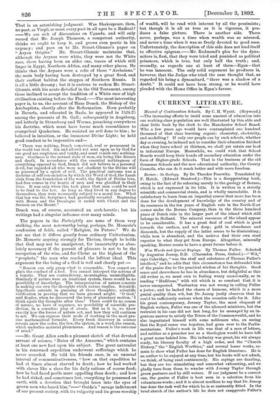Wise Words and Quaint Sayings. By Thomas Fuller. Selected by
Augustus Jessop, D.D. (Clarendon Press, Oxford.)—" Wit," says Coleridge, " was the stuff and substance of Thomas Fuller's intellect," and he adds that this circumstance has defrauded him of the praise due to the practical wisdom of his thoughts. Good sense and shrewdness he has in abundance, but delightful as this old writer is, we must own to feeling weary occasionally, as in reading " Hudibras," with wit which is so constant that it is never unexpected. Warburton was not wrong in calling Fuller a jester; and he lacked the charm of humour, which is a more genial quality than wit, but Dr. Jessop justly observes that he could be sufficiently serious whed the occasion calls for it. Like his great contemporary, Jeremy Taylor, the most eloquent of English writers, Fuller was one of the silenced ministers, but the restraint in his case did not last long, for he managed, by an in- genious answer to satisfy the Triers of the Commonwealth, and he also ingratiated himself with some noblemen who, on seeing that the Royal cause was hopeless, had gone over to the Parlia- mentarians. Fuller's work in life was that of a man of letters, and neither as a preacher nor as a theologian would he have left a great name behind him. His industry was great, his wit always ready, his literary faculty of a high order, and the "Church History," the " English Worthies," and several lesser works, re- main to show what Fuller has done for English literature. He is an author to be enjoyed at any time, but his books will not admit, we think, of being read continuously. His sayings are dazzling, but they are too stimulating and somewhat exhausting, and we gladly turn from them to wander with Jeremy Taylor through green pastures and by still waters. If our judgment be a correct one, the genius of Fuller is best seen in a selection from his voluminous works ; and it is almost needless to say that Dr. Jessop has done the task well for which he is so eminently fitted. In the brief sketch of the author's life he does not exaggerate Fuller's
power, and is careful to define its limitations. This is done with a master's pen, and it is not necessary to accept his estimate un- reservedly in order to see that it is thoughtful and impartial. The editor does not say too much, and the reader unfamiliar with Fuller will turn more readily to his pages after reading this in- troduction.



















































 Previous page
Previous page